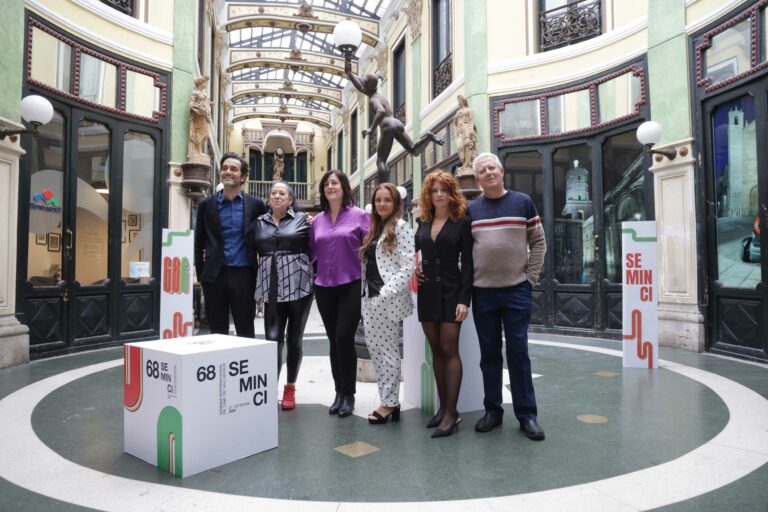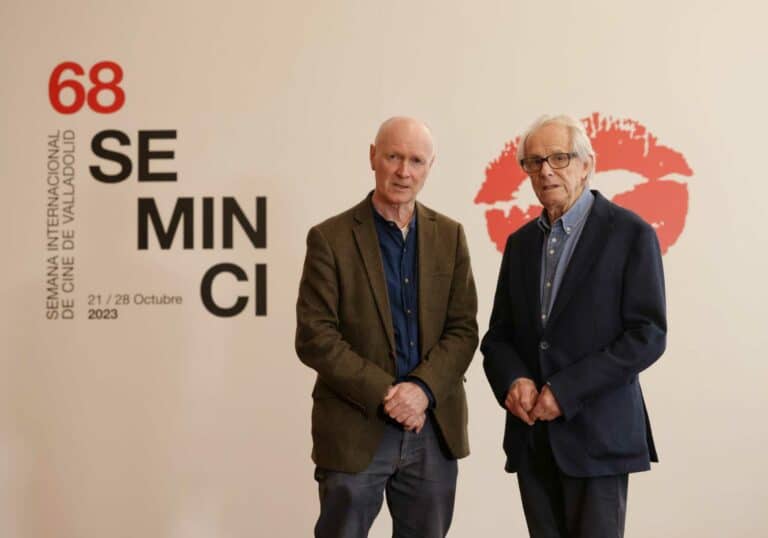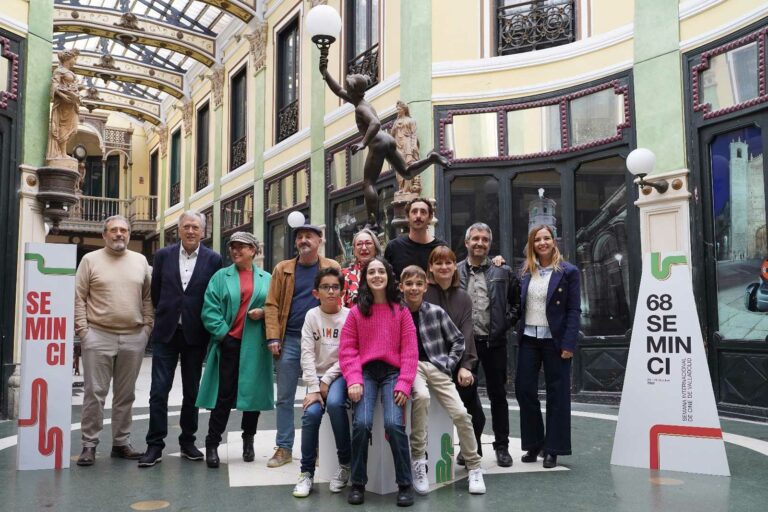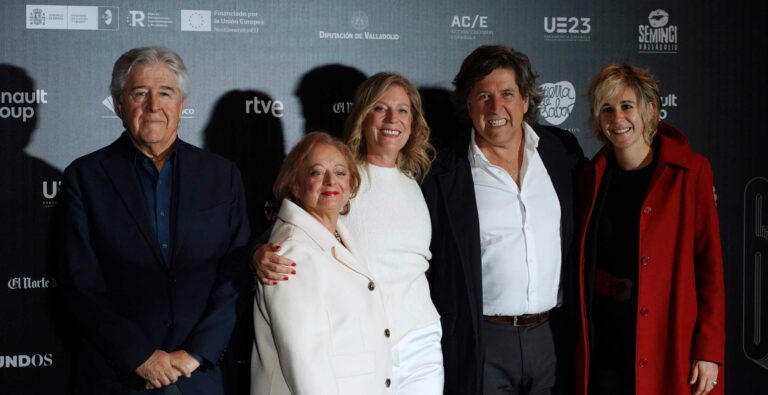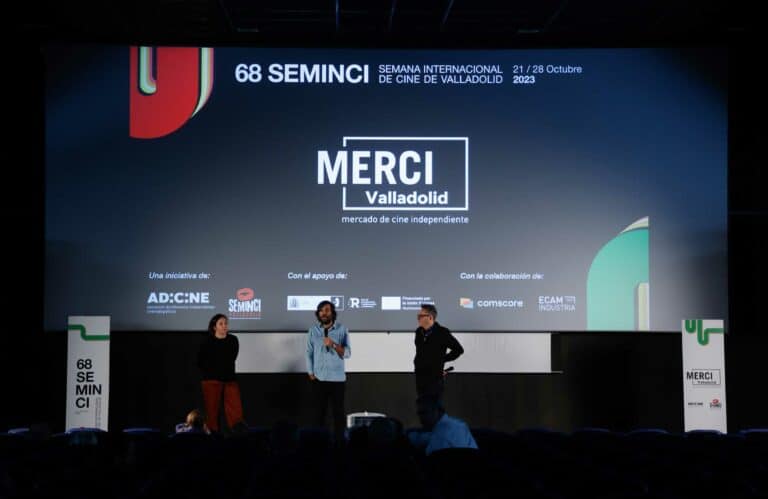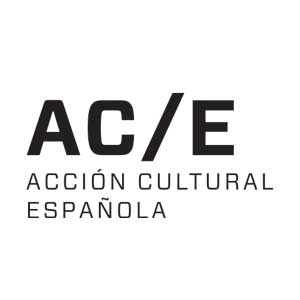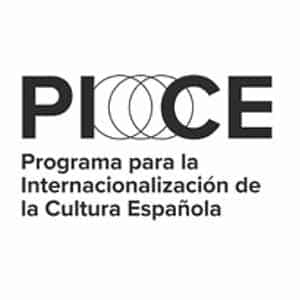The Day of Spanish Cinema has experienced its most stellar moment with the presentation of the four Espigas of Honour to the four leading figures of Spanish cinema, the actress Victoria Abril, the directors Fernando Colomo and Manuel Gutiérrez Aragón and the producer Andrés Vicente Gómez, in a packed Calderón Theatre. The four received the tribute and recognition of the Festival for the essential pages they have written in the history of Spanish cinema under the individual applause of the audience, which intensified when the four posed together on stage.
Preliminary meeting with the honorees
The commemoration began with a press conference attended by the producer Andrés Vicente Gómez and the filmmakers Manuel Gutiérrez Aragón and Fernando Colomo.
The three began the meeting by discussing their careers and defending a cinema made with the means to be “truly independent”.
They are three fundamental figures in Spanish cinema in recent decades. They appear in the credits of emblematic films such as Habla, mudita (1973), Tigres de papel (1977), Demonios en el jardín (1982), Bajarse al moro (1987), Jamón, jamón (1992), El día de la bestia (1995) and La niña de tus ojos (1998), to name but a few of the dozens that make up their respective filmographies. They are the producer Andrés Vicente Gómez and the directors Manuel Gutiérrez Aragón and Fernando Colomo, essential names in Spanish filmmaking, to whom the 67th edition of the Semana pays tribute with the Espigas de Honor for Spanish Film Day, together with the actress Victoria Abril.
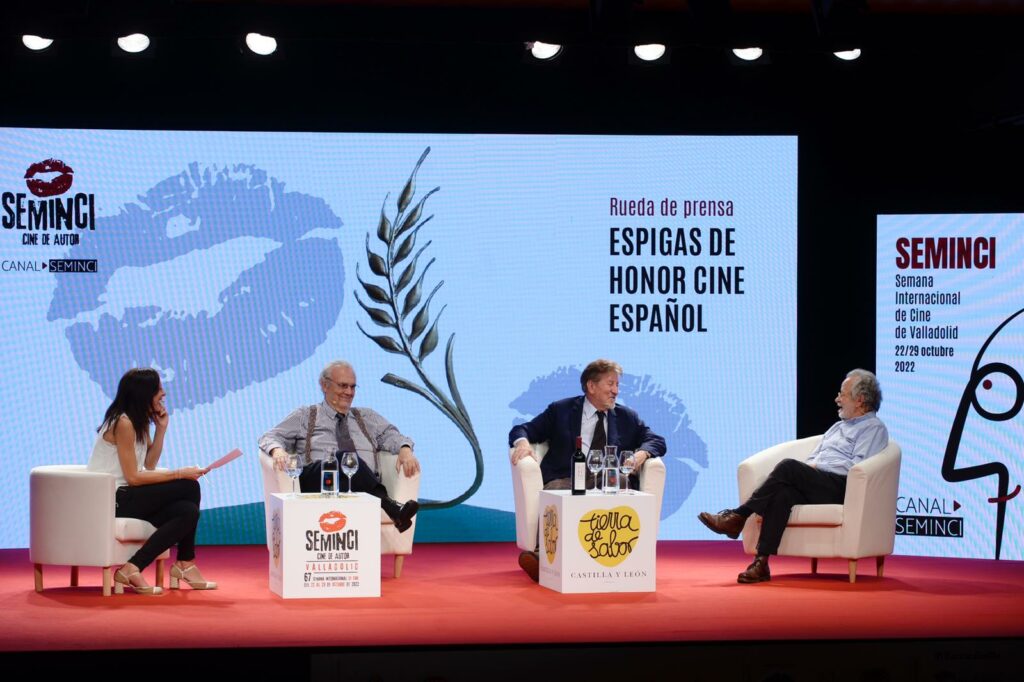
Vicente Gómez, Gutiérrez Aragón and Colomo talked about their careers during the press conference prior to the gala, in which they agreed in defending the importance of a cinema made with the means to be “truly independent”, something they consider that, in recent years, has been diminishing in an industry dominated by platforms and television.
“It’s not that cinema has democratised, it’s that the costs have become cheaper”, reflected Gutiérrez Aragón, who has been focusing since 2009 on his work as a novelist and who has defended the search for “rigour” in an increasingly saturated market. “We have to think about the concept of independent cinema”, said Vicente Gómez, for whom Elías Querejeta‘s films were “true independent cinema”. “Making a film from home with a mobile phone is not independent cinema, because you depend on the financing you lack”, continued the producer responsible for bringing an Oscar to Spain for Belle Époque (Fernando Trueba, 1992), currently based in Saudi Arabia, where he is helping to develop his, until now, meagre film industry. “What has been created is a tremendous mess”, added Colomo in reference to platforms such
as Netflix.
The three honorees contrasted the current situation with the one that existed in Spain in the last decades of the last century, when, they also agreed, they had “the public on their side”. “Today you couldn’t make Habla, mudita”, said Gutiérrez Aragón about his debut feature, the story of an intellectual who tries to teach language to a young mute girl in a mountain village, which was made possible “thanks to Elías Querejeta“. “Independent films now lack someone to say: “this film needs to be made with more money”, the filmmaker said. And the fact is that making a film “is more than shooting it, it is distributing it”, added Vicente Gómez, who illustrated his approach with his experience in films such as Jamón, jamón (Bigas Luna, 1992) and El día de la bestia (Álex de la Iglesia, 1995), for the release of which the producer, who accepted a script rejected by numerous production companies – among them El Deseo, owned by Pedro and Agustín Almodóvar and responsible for De la Iglesia’s previous film (Acción mutante) – sought out a cinema specialising in horror, the Rex, where the film aroused great expectation, which materialised in very long queues.
John Ford, Italian cinema and Tarantino
The three winners of the Espigas de Honor also took advantage of the meeting to review their cinematic influences and tastes. They all praised the work of John Ford, whose films “invented cinema”, and mid-century Italian cinema. “It was a cinema that was liked because it united great plastic beauty with the tastes of the spectators; they were films that people went to see, I don’t say popular, but with an audience”, commented Gutiérrez Aragón, for whom combining quality and audience “is the most difficult thing there is in cinema”.
The name of Quentin Tarantino also came up during the colloquium, as he is the filmmaker of reference for Andrés Vicente Gómez. “He is a very complete filmmaker”, said the producer, who valued both his provocation and the profitability of his films, while Fernando Colomo praised Woody Allen, of whom he said that “he has dignified comedy” and David Lynch, whose films he described as “very visually stimulating”.
The three honorees then received their awards at the gala in Spain for their fundamental contribution to the country’s culture. As Gutiérrez Aragón said, “you can stop making films, but you can’t stop being a filmmaker”.
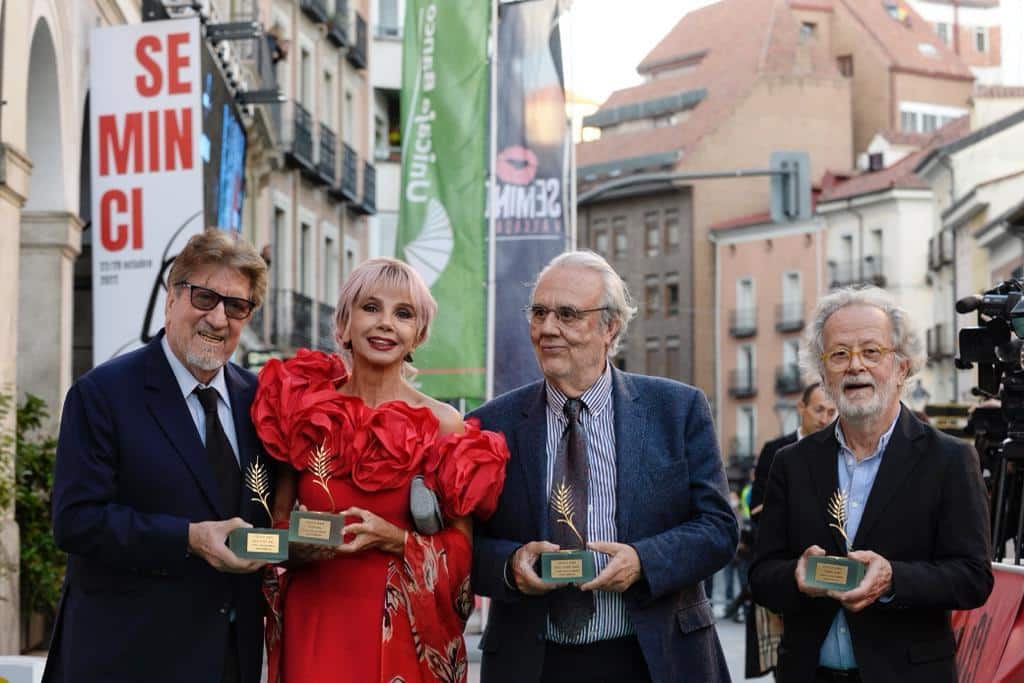
Spanish Cinema Day Gala
The first to receive the honorary award at the Spain Day Gala was the director Manuel Gutiérrez Aragón, who was presented with the award by the distributor Enrique González Macho and the writer Manuel Vicent. The Cantabrian director, now devoted to literature, received the first ovation of the evening after Vicent emphasised that we owe him “some of the best films in Spanish cinema”, a statement that connected with the words of praise also dedicated to him by González Macho, for whom Gutiérrez Aragón‘s filmography can be considered an “encyclopaedia” of the history of Spain.
The honoree expressed “a certain nostalgia” on receiving the Espiga de Honor of the Seminci in a city where, he recalled anecdotally, his series on Don Quixote passed a trial by fire with the public watching his work for five hours and forty-five minutes without moving. He was also happy to receive it from two people who represent cinema and literature, “what I like most in the world”.
Secondly, it was the turn of Fernando Colomo. The director from Madrid received his honorary award from actor Karra Elejalde, who presented him as “a great friend, a great director and a great actor”.
After receiving Elejalde‘s affectionate embrace, the figure of the spike and the applause of the audience, Colomo said that it was an “honour” for him to receive this recognition at the Seminci, especially as he is considered a comedy director, a genre that “has always been underrated at festivals”.
The producer Antonio Saura and the director of photography José Luis Alcaine were in charge of presenting the Espiga de Honor to Manuel Vicente Gómez, who said he was “very happy” to receive the award in “such a film-loving city and in this Seminci”, a festival that he has followed “for so long”. “I have made films because I didn’t know how to do anything else”, said the producer of 135 works after Alcaine referred to him as “possibly the last active producer of an era in which he was almost everything” and Saura praised his ability to transform the great cinema made in Spain into commercial cinema. “He dreamt that we could conquer the world and he conquered it”, emphasised the man who has also defined himself as Andrés Vicente Gómez‘s “lapdog” because he is simply “a genius”.
Finally, Imanol Arias received the Espiga de Honor of the Valladolid International Film Week from the hands of the actress Victoria Abril, “the best living actress in Spanish cinema”, as the actor defined her when he welcomed her on stage.
“Thank you very much Valladolid for this Festival that has been dedicated to our cinema for so many years”, began the charismatic actress, before giving a detailed review of her long career in film, a discipline that has “saved her life” on several occasions, she said. Before receiving the applause of the audience at the Teatro Calderón, Victoria Abril thanked “everyone, professionals, amateurs and the public” for having “allowed her to exist” with a very special memory also for her “triple A” (Aranda, Agustín Díaz Llanes and Almodóvar“.
The Day of Spanish Cinema came to a close with the screenings of two national works selected in the Official Selection, the short film Son, by Marta Nieto, and Vasil, the debut film by the Valencian Avelina Prat.



